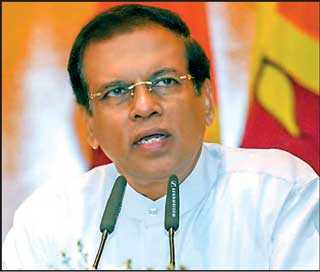Saturday Feb 21, 2026
Saturday Feb 21, 2026
Friday, 19 April 2019 00:00 - - {{hitsCtrl.values.hits}}
By Uditha Jayasinghe
The long delayed National Procurement Guidelines are expected to be presented to Cabinet next week, an official said yesterday, possibly ending nearly a year-long wait.
 |
President
|
 |
Christy Perera |
The guidelines have already been sent to the Cabinet Office and are expected to be tabled by President Maithripala Sirisena before the end of April. The guidelines were gazetted on 9 May 2018. They were subsequently presented to the Presidential Secretariat last year. However, when the final report was presented to Cabinet, it was set aside, as the Finance Ministry had wanted additional time for observations.
“We have been assured that the guidelines will be presented to Cabinet within this month. Afterwards they will be gazetted again to include any changes that have been made. After that we hope it will be presented to Parliament,” National Procurement Commission (NPC) Commission Member Christy Perera told the Daily FT. The National Procurement Guidelines were formulated by the National Procurement Commission, after nearly three years of exhaustive consultations. During the formulation process, two drafts of the guidelines were presented for stakeholder feedback, including from Ministries such as the Finance Ministry.
The new guidelines have been upgraded from the previous regulations, introduced 12 years ago, and include several progressive measures, including a framework agreement, new information systems, and provisions for the Government to implement an electronic procurement system.
The new guidelines also infuse value engineering processes as practiced in developed countries, which enable the Government to reduce cost overruns in crucial infrastructure projects. Commission members estimate that value engineering could save the Government a minimum of 10% on all construction-related contracts.
The guidelines also include technical auditing of tenders, and give powers to the National Procurement Commission to vet officials appointed to tender boards.
If suppliers highlight conflict of interest on an appointment, the Commission would also have the opportunity to raise this with other Government parties, such as the Attorney General. Tender documents will also be shared, so that other Ministries and State departments can observe the tender process.
To ensure high levels of transparency once the new procurement guidelines become law, bidders will be given a comprehensive debrief three days after a tender is closed. Aggrieved parties can present themselves before the procurement appeal board six days after a decision is made, and if they are unsatisfied with the response, can appeal to the Supreme Court. After the tender is awarded, any member of the public can obtain the full tender evaluation committee report.